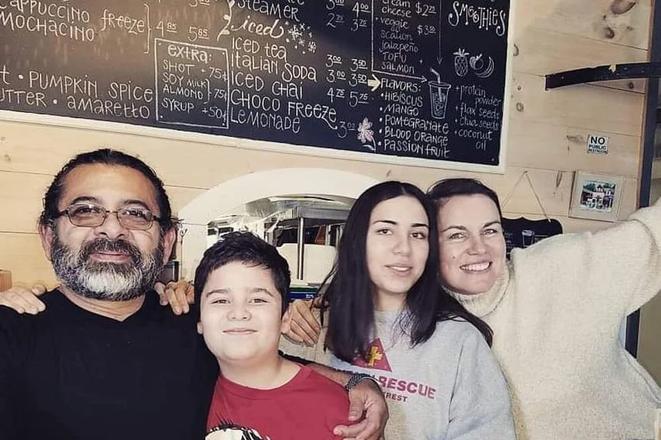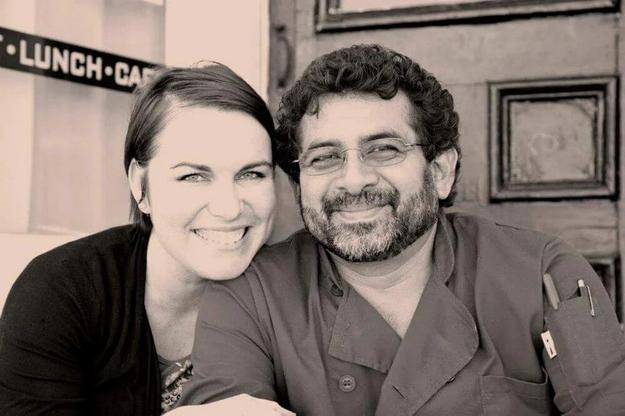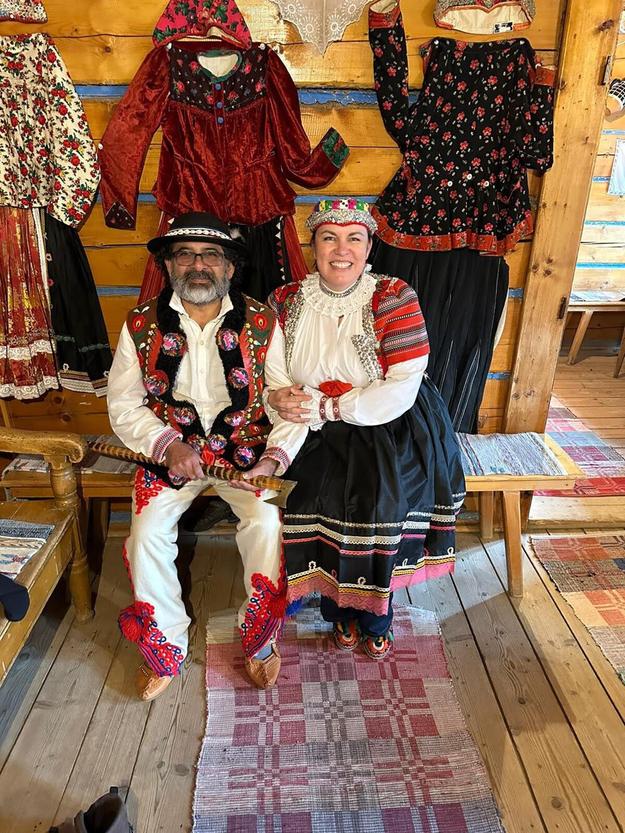She experienced the fall of the Twin Towers in New York, nine years of separation from her family, and the tough start of running a business. Yet, she has never forgotten her Orava roots - both her children speak fluent Slovak.
Lýdia Martinez Majdišová was born in Trstená, spent her childhood in Tvrdošín, and later lived in Dolný Kubín. She has been living in America for over 20 years, having settled on Shelter Island, where she and her husband run a well-established café and restaurant.
Everything suddenly changed
In her third year of secondary school in Dolný Kubín, she travelled abroad for the first time, spending a year studying in Canada. After successfully completing her school-leaving exams in Slovakia, she pursued a degree in teaching, specialising in English and Slovak language and literature.
“During my studies, friends convinced me to go to the USA for a summer job, and that decision changed my life,” recalls Martinez Majdišová.
It was in 2001 that two young students found themselves in the Hamptons on Long Island, New York. Martinez Majdišová spent the entire summer working in a local café. The girls met many interesting people, travelled extensively, and got to know America. It was during this time that she also met her future husband, though it would be a few years before they became a couple.
“Then came the terrorist attack and the collapse of the Twin Towers. It was surreal – people fled to the Hamptons because New York City became unlivable. We experienced it first-hand. Suddenly, everything changed – travel, the way tourists were perceived, security measures.”
Nine years of separation
Following these tragic events, Martinez Majdišová returned home, completed her studies, and graduated. As a newly qualified teacher, she set off to visit her sister in Sydney, Australia.
“I didn’t know what to do with myself – I wasn’t drawn to teaching; I wanted to travel and see the world. I couldn’t stay in Australia for long, so I decided to return to my old job in New York to earn some more money.”
At the time, she had no idea of not returning to Slovakia anytime soon. Fate had other plans – Martinez Majdišová met her soulmate, her current husband, who was originally her employer. It was 2003.
“We grew close, and I couldn’t imagine a future without him. A year later, our daughter was born, and there was no turning back,” she says.
For the next nine years, until she secured the necessary paperwork, Martinez Majdišová was unable to travel back to Slovakia.
“It was brutal, depressing, but we got through it. My first visit home was surreal – I felt like I was in a daze, and to top it off, I arrived just in time for my brother’s wedding, where I was reunited with my entire extended family.”
After those difficult years, she now returns to Slovakia with her family at least once a year.
Following her heart
Martinez Majdišová did not leave home in search of a better world. As she says, she loves Orava, carries it in her heart, and has often shed tears over it. For the sake of love she swapped Orava for New York. Together, she and her husband have been through many ups and downs, but she chose to stay in America for him and their family. Still, when the children were little, she would have preferred to raise them in Slovakia.
“For my husband, though, the language barrier would have meant he couldn’t work, and I didn’t want to put him in that situation or subject him to cultural shock. He is originally from Mexico and has lived in the USA for 40 years, where he had his own business. It was simply easier for me to adapt.”
Her parents took her departure the hardest. She is one of four siblings, and as the eldest, she had been with them the longest. “To this day, I carry my mother’s words in my heart – how she begged me to make sure my children could speak Slovak so that she could communicate with her own grandchildren. So I made sure to instil in them a love for Slovakia, for our family, for Orava, and for our culture.”
Her efforts paid off – both her children, now a 20-year-old daughter and a 16-year-old son, speak fluent Slovak. One of them even attended a school year at Martin Kukučín Primary School in Dolný Kubín.
The perfect place to live
The idea of a peaceful life with locally sourced food in New York might seem impossible to many, but Martinez Majdišová truly lives in a part of the USA that many Slovaks would dream of.
Her family resides on the small island of Shelter Island, home to 2,500 permanent residents. Accessible only by ferry, crime is almost non-existent. Locals commonly leave their car keys inside their vehicles and their doors unlocked. In summer, the population swells to 10,000 as tourists arrive at their summer homes, but this does not detract from the island’s beauty.
“I fell in love with the tranquility, nature, the ocean, fresh air, fresh seafood, farms, vineyards,” Martinez Majdišová shares. “Almost everything essential is available from local production – vegetables, fruit, grapes, wine, fish, game, milk, butter from nearby farms. I love it.”
On the island, bartering between locals and businesses still thrives. People are generally kind and helpful, and community cooperation is at an exceptional level. The locals work together to create something better and support each other in times of need, whether due to illness or tragedy.
“The entire community rallies around you, providing food and financial support for essential needs. Collections are organised, as well as masses for those in need. Even the churches – we have four – contribute to helping people. This is common practice here, and I think it’s wonderful. This is how it should be everywhere.”
There are about 15 NGOs on the small island, each helping in different areas of public life. Martinez Majdišová runs one herself, supporting children and students by funding their extracurricular activities.
“We organise collections and redistribute the money so that children on the island can attend various clubs, camps, or courses. It’s a great system of collective effort – money flows from those who can give more or less to those who truly need it.”
A business built from scratch
Since 2005, Martinez Majdišová and her husband have been running their own restaurant and café. The beginnings were tough – they had little knowledge of the business, no market research, and no local connections. But the opportunity to rent a space was too tempting to pass up.
“It was a gruelling battle,” Martinez Majdišová recalls. “I would have given up a hundred times, but my husband was unwavering. He kept saying that a business isn’t built in a year or two, and he was right. We run a small but incredibly lively restaurant where people are constantly coming and going, meeting for coffee, and socialising. Over time, we expanded our menu, opening hours, and services.”
Today, in addition to their restaurant, which operates 364 days a year, they offer catering, bake cakes, organise weddings, run a beach food truck, and even roast their own coffee. Martinez Majdišová has brought a piece of Slovakia to New York, baking traditional Slovak cakes, Christmas gingerbread, and homemade jams. “Everything is in high demand, and we’re fortunate to have a team of people who help us manage it all.”
Despite the hard work, Martinez Majdišová and her family have found their place in America. Still, Orava remains in her heart. And perhaps one day, she and her husband will return home for good.
© My Orava

 Lýdia Martinez Majdišová and her family (source: Courtesy, Lýdia Martinez Majdišová)
Lýdia Martinez Majdišová and her family (source: Courtesy, Lýdia Martinez Majdišová)
 Lýdia Martinez Majdišová with her husband (source: Courtesy, Lýdia Martinez Majdišová)
Lýdia Martinez Majdišová with her husband (source: Courtesy, Lýdia Martinez Majdišová)
 Lýdia Martinez Majdišová and her husband wear traditional folk costumes during a visit to Slovakia. (source: Courtesy, Lýdia Martinez Majdišová )
Lýdia Martinez Majdišová and her husband wear traditional folk costumes during a visit to Slovakia. (source: Courtesy, Lýdia Martinez Majdišová )